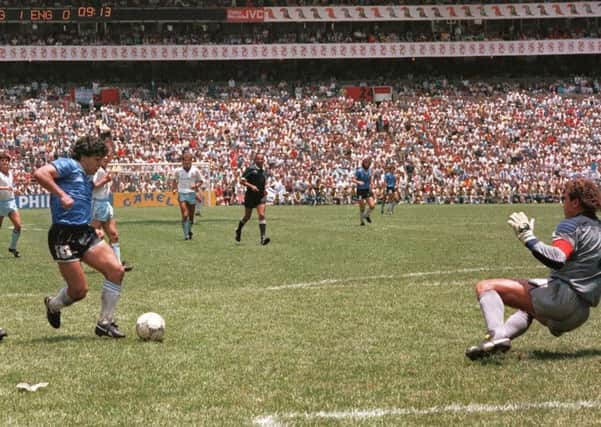Kevan Christie: Diego Maradona was no cheat, he will always be the greatest


Halfway through watching the Diego Maradona movie at the Cameo Picturehouse last Sunday my friend turned to me and said - ‘I’d rather win the World Cup than the Falklands’.
I chuckled, then watched spellbound as our vertically challenged hero growled at the English during the anthems - out jumped their six foot goalkeeper Peter Shilton to score the opening goal before beating half their team, including Shilton again to calmly slot home the second.
Advertisement
Hide AdAdvertisement
Hide AdJob done - have a goal of the century award Diego and here’s the 1986 World Cup for your bathroom to look at while you snort another rockstar line.
“Just say Yes”.
Serves them right for leaving John Barnes and Chris Waddle on the bench.
‘Las malvinas son argentinas’ - not to be old bean but we did rid you of that dictator Galtieri and the hated military junta. As a football-mad teenager growing up in the 80s Maradona was and still is my ultimate hero. The one we all aspired to be with hours spent desperately trying to put some top spin on a Tango football bent round an imaginary wall, on a piece of waste ground at the back of the local cash & carry.
Sure, the English will always call him a cheat - but with Shilton caught napping the ‘Hand of God’ goal as it came to be known was nothing more than a spur of the moment thing any playground chancer would try. Up to the ref and the linesman as they were still called back then to spot the ‘thief’ picking their pocket.
Maradona was anything but a cheat in this period as the new feature-length documentary Diego Maradona from Asif Kapadia the guy who made Senna and Amy, which were also brilliant - makes clear.
He was the working-class hero to millions of Neopolitans, Argentinians and football fans who went from sinner to saint and back to sinner again in a trophy-laden seven years marked by a full-blown addiction to cocaine, a desire for endless nightlife and prostitutes that left him at the beck and call of the local Camorra crime clan. Football-wise there was no diving here, no ‘coming togethers’ ooh err missus!, whatever that means - only a succession of brutal straight-red challenges that would get you jailed if committed in the street, by the kind of defenders Pablo Escobar let go from his Sunday pub team for being too violent. And that’s not including the off the ball stuff, basically a smack in the pus when the ref wasn’t looking which happened to Maradona on a regular basis...and he never complained.
Much as the old game of making comparisons between sports stars of now and yesteryear is fun but pointless I will always make the case for Diego over the likes of Messi and Ronaldo. More of a leader, taking rubbish teams to glory his sheer dynamism and bravery in playing what was still a very physical sport - puts the pampered Instagrammers and serial divers of today’s virtual non-contact football to shame.
He liked his steak, there was not a protein shake in sight and he started on the coke, willingly supplied by the gangsters, after the game on a Sunday. Diego would stop on the Wednesday to ‘detox’ just in time to get ready for playing against the best players in the world in the top league. Impressive by anyone’s standards - even Michael Gove’s - but don’t take drugs kids.
Advertisement
Hide AdAdvertisement
Hide AdMaradona dropped into Naples in 1984 - seeking peace - after a tumultuous spell at Barcelona which included him trying cocaine for the first time in a nightclub “and I felt like Superman” and ended with a mass brawl against Bilbao with flying kung fu kicks and Diego knocking a rival out with his knee.
Napoli, who had never won a league title, were the only club prepared to pay the £6.9m asking price, then a world record, for this mercurial talent. He may not have found peace but he did find “Gomorrah” and the love of a people mocked by the rich north.
Maradona ended up delivering them two league titles and a UEFA Cup, while single-handedly winning the 1986 World Cup. Destroying the old maxim that ‘one man doesn’t make a team’. As the movie shows and let’s call it a movie not a documentary because that’s what Diego’s life was, the seven years he spent at Naples ended in disaster. Maradona ended up doing a runner as the whole of Italy turned on him after Argentina knocked the host nation out of the 1990 World Cup and he persuaded the hardcore Naples “Ultra” fans to support him. There was a messy paternity case involving a son who the mother named Diego Armando Maradona which may have provided a not too subtle hint as to who the father was.
I would urge everyone to see this movie, you don’t have to like football or Maradona to enjoy it. It captures the madness of Naples in the 80s, has a soundtrack that would put Moroder to shame and Diego makes Tony Montana in Scarface look like a monk. For someone like me permanently stuck in the 80s the movie represents a time when sport was magnificent theatre marked by great rivalry, global events and as yet untarnished by corporate greed. A time when the likes of Borg v McEnroe, Coe v Ovett, Higgins v Davis, and Everett v Navratilova kept millions of TV viewers enthralled. Those days are gone now, replaced by non-entities with their own clothing brands and goal celebrations but for 2 hours and 10 minutes - they return in all their glory.
Diego Maradona is out now.